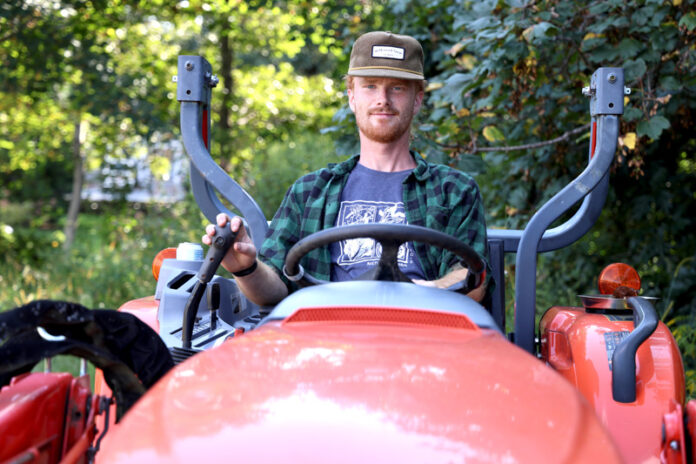Growing up on the Island, I felt the urgency to leave and get out into the world, a common theme for many kids in any hometown as they approach the end of high school. To head out to college, travel, or just try something new. The Vineyard brings an even stronger urge to leave because we are on an Island. When visitors find out I was born and raised here, there is often a look of shock and disbelief as if how could that be? Are there schools, hospitals, what’s open in the winter? How do you leave, do you leave? People forget there is a consistent year-round community that lives and works, keeping the engines going and lights on.
The Island will always have a call for young people to stay in the community. I spent most of my career in the food business, and I now work in real estate. I have a son who is a regenerative farmer on the Island. I have had a curious, perhaps magnified, look at where we are with the younger generation. For this article, we focused on young adults raised on the Island — Gen Zers, born after 1997, who have chosen to stay and farm or fish. Some of this group grew up in the family business they now work in. Others fell in love with their chosen industry at a young age.
They all have a strong love of this community, determination, gratitude, focus, and optimism. Housing was certainly front and center; I found it unusual for such a young group to have that much awareness and understanding of the challenges of creating a life on the Island. That said, they are forging ahead, dreams in hand.
Editor’s note: I did not interview my farmer son; Mollie Doyle pitched in to get an unfiltered point of view.
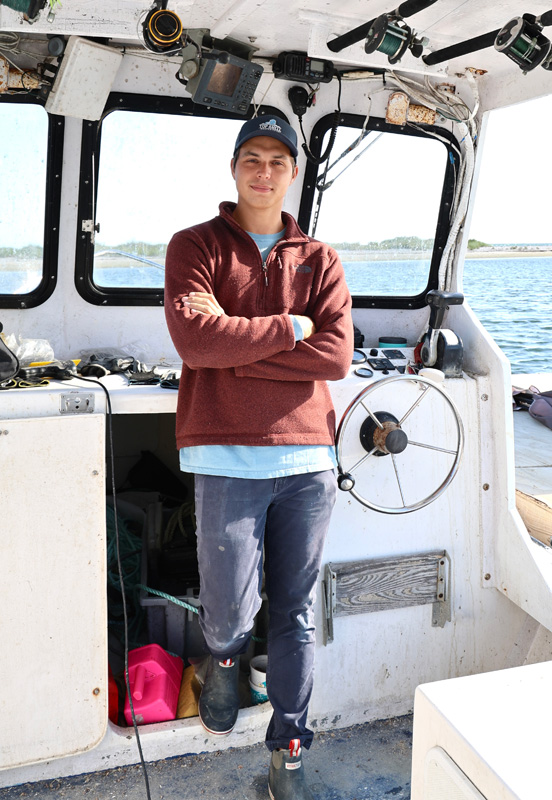
Liam Cosgrove
Liam is a 26-year-old Islander whose love for the ocean keeps him here. In 2020, Liam and a business partner started Top Shell Oyster Farm after acquiring an aquaculture license from Edgartown to farm oysters out at Middle Flats, just north of Eel Pond. Liam says support from legendary oyster farmer Jack Blake and the Martino Brothers of Cottage City Oysters taught him everything he knows. Liam says his oysters are medium-sized, really sweet and creamy. He was off to a great start, selling his oysters through Cottage City Oysters.
When did you know you wanted to stay here?
Growing up on the Island, I always knew I needed to work on the water. After a brief stint at college and traveling the U.S., I realized that there was nowhere like the Island, and this was my home.
Why oyster farming?
After taking an oyster farm tour with Cottage City Oysters a few years back, Dan and Greg Martino said on the tour anyone interested in learning more about oyster farming to let them know. I stepped up and, to my surprise, was sold on it.
What do you love about your life here and your work?
The community here is absolutely crazy good. When I decided to start my business with a partner, we ran a Kickstarter campaign. I was overwhelmed by the support. You just cannot beat this community. To top that, I get to be on the water, taking my boat out to the farm. It’s gray and calm, and you cannot see where the sky ends and the ocean starts. I could live in that feeling forever.
What challenges do you see for the Island?
The housing crisis is really difficult. I am lucky, I actually have a year-round apartment rental with very good people. Many oyster farmers around the world make a little bit of money and buy waterfront properties so they can build facilities and scale their businesses. They could sell directly, but that can never happen. I will always have to use a middleman to sell my oysters.
Where do you see yourself in 10 years, your industry?
I would like to scale the business to a size I can supply a large chunk of restaurants, making this my only job. I do not need to do anything but farm oysters. Oh, and own a home, of course.
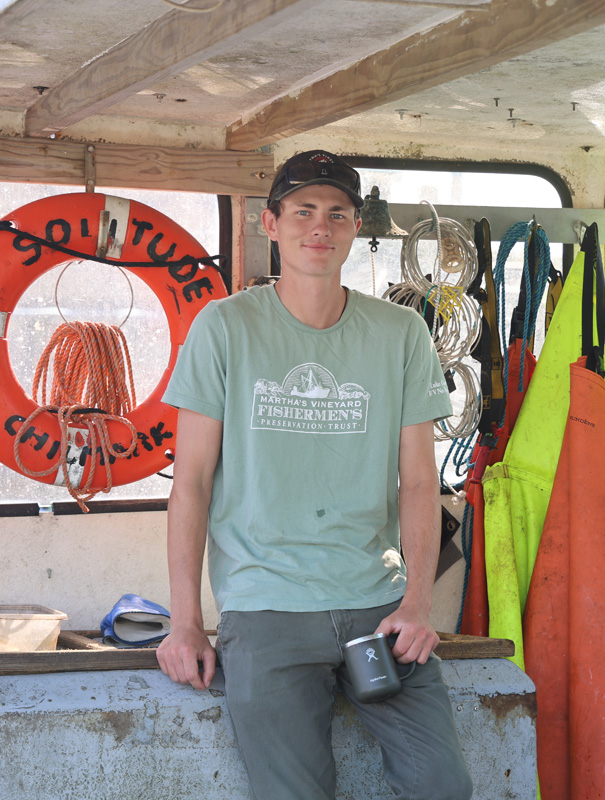
Chris Mayhew
Chris Mayhew is 24 years old and is a commercial lobsterman out of Menemsha. Chris’s boat, Solitude, is docked in Menemsha Harbor next to his father, Jonathan Mayhew’s, boat, Skillie. Chris graduated from the University of Rhode Island with a degree in aquaculture and fisheries science. He comes from a long line of fishermen. His father, Jonathan Mayhew, owned the Quitsa Strider ll, and his Uncle Greg and his grandfather were also fishermen.
When did you figure out commercial fishing, lobstering was what you wanted to do?
For my whole life, my dad has shared a dock with Pat Jenkinson. One day, Pat hung a for-sale sign on his boat, Solitude. That’s when I knew I wanted to do this. Getting into commercial fisheries is extremely difficult. It seemed overwhelming. Pat was ready to retire from lobstering but wanted to keep his license local in Menemsha, going to someone on the Island. I got really lucky. There are not many opportunities to get the permits, it is rare for them to become available — and costly. It’s just hard to break into the fisheries industry. Pat has been really helpful, like a mentor, always able to help out when I have questions.
What do you love about your life here and your work?
Well, you can’t not love being on the water. Sometimes, [I think] is this really my job? The weather isn’t always great, but at the end of the day, I am lucky, and I like being my own boss. I determine my schedule, and you really get out what you put in. There are times when you don’t make anything, and then you have a great month. July is the best month for lobstering, and everyone knows it. They say everyone catches lobster in July and then you go to work.
What challenges do you see for the Island?
Housing! The housing market is insane right now. I do not see owning a home anytime soon. I am lucky that my family has been around a long time, so there are family places to stay. I am grateful. But it will not last forever, as the generations go forward properties get sold.
Where do you see yourself in 10 years, your industry? Your hopes.
I hope to build on this. I am also looking to buy a conch permit to fish year-round. I also need a new engine eventually, so I will work towards that for now. Eventually, start saving for a home.
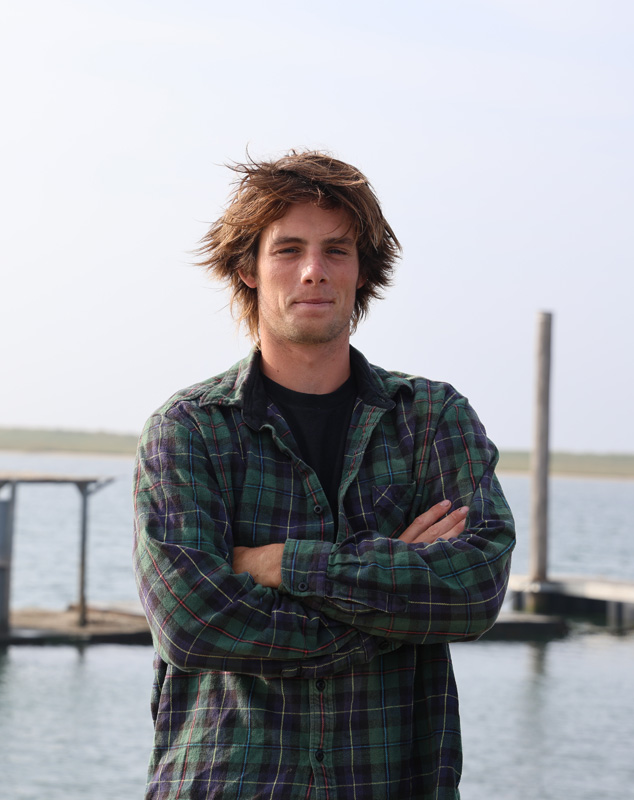
Matteus Scheffer
Matteus Scheffer is a 23-year-old commercial fishman and oyster farmer at Little Minnow Oyster Co. out of Edgartown with his grandfather, Roy Scheffer. Roy Scheffer was one of the original oyster farmers with Jack Blake on Katama Bay who, over the decades, have supported and taught new generations of oyster farmers, helping create a sustainable, supportive, thriving aquaculture future. Matteus’ Great Uncle Louis Larsen sold a scallop boat to him and his partner, Grace Kenney. They named it Anita Penny, after their two grandmothers. Do you hear the pun in Anita Penny?
When did you know you wanted to stay here?
I graduated from the University of Rhode Island, where I studied and got a degree in aquaculture and fisheries sciences. And then I came back here and started fishing. My whole family is here and growing up on the Island, this is the place I want to be because this is home, and everything that I want to do is probably here.
When did you figure out shellfishing and oyster farming was what you wanted to do?
My grandfather asked me to work for him my senior year in high school, and I had a general idea because I grew up with my dad out of Menemsha Pond; he was the shellfish constable. I just spent days with him because they didn’t bring me to summer camp. I just spent a lot of days on and in the water and kind of fell in love with it.
What do you love about your life here and your work?
I can kind of make a living being out in the water every day, shellfishing or oyster farming. Providing food for people on the Island is something that I’ve taken to be super special now. And it’s really hard work. I love being in the water and working hard, and some days are really good and some days are really not good. And just the sense of community. I mean, I’ve had so many people help me get started, buying the first boat that I’ve been shellfishing on and helping me with certain rakes and equipment you need to catch quahogs and bay scallops, and just the community here is amazing for that. And there’s people out here that really want you to succeed and make it, and I think that’s great.
What challenges do you see for the Island?
Challenges? Definitely housing. I just know so many kids my age that are just really trying to get out of their parents’ houses because to be honest, like when you’re 23, it’s hard. You can have a great relationship with your parents and whatever, but you want to do your own thing. You want to have your own space, and unfortunately, space is getting really limited on the Island.
Where do you see yourself in 10 years, your industry? Your hopes.
Well, in years, hopefully, I’ll expand my fishing operation. I’d love shellfishing, but I also would love to expand and to get a bigger boat, maybe some bigger Massachusetts state permits. To be able to make more money, maybe afford a house one day, I hope. Within 10 years, I’d be able to have a house and be living here and not be super tight on money.
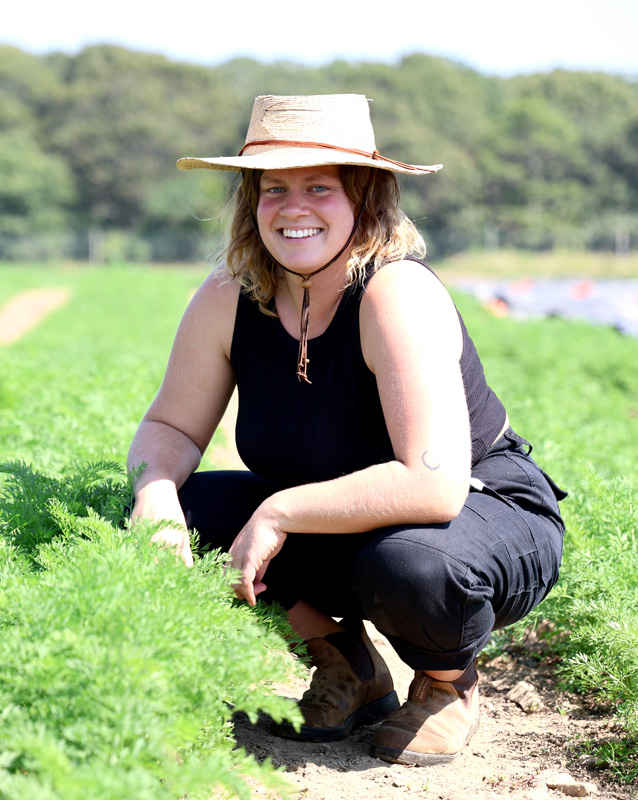
Astrid Tilton
Astrid is 25 years old and has hit her stride as the gleaning manager at Island Grown Initiative. Astrid graduated from Hampshire College, where she studied photography. The day I met with Astrid at IGI, they had gleaned 850 pounds of eggplant donated from Morning Glory Farm, which will feed Islanders. Astrid’s roots run deep on the Island; the Tiltons were some of the earliest European settlers going back to the 1600s.
When did you know you wanted to stay here?
COVID made it a pretty easy choice to come back here after school, but I also didn’t have any other plans. I wasn’t always set on coming back here, but I also couldn’t think of another place that I would really want to go. I just knew that IGI would hire me after school and I really liked living on the Island, so that seemed like a good option to me. And every year I’ve continued enjoying living here so I just kept doing it.
When did you figure out farming at IGI was what you wanted to do?
I do credit a lot to the Charter School through their mentorship program, especially since I had both a photography mentor, David Welch, and then with Noli (Noli Taylor, senior director of programs at IGI), and both of those things felt really good to me. So, I chose to go to Hampshire. I found that working with the natural world allows me to use a lot of the same skills as photography. And I approach my life practice of being a young gleaning manager like an art practice.
What do you love about your life here and your work?
I was thinking about this a lot. In my daily life everything feels really pleasant to me. And it’s just like, everything’s pretty beautiful. I like my drive to work. I like being here. After work, I like to go to the beach. I am so connected to the ocean of course. And I like the pace of life. Yeah, it’s a little slow, which I really don’t mind. I like to be kind of thoughtful and slow in the winter. And then I like a little drama in the summer.
What challenges do you see for the Island?
Yeah, housing, of course. Yes. Housing troubles. When I first moved back here, I was more depressed about it because it just seems kind of overwhelming. It was kind of daunting, the amount of money that I will have to make. To make my first million, ha!, but yeah, honestly, I’m feeling okay, now that if I really want to live here, I can make it happen, I can make it work. But then the idea that it is really hard for other people, and having my friends move away. And I wonder, is it going to be really lonely here In a few years? I found an apartment, which is shocking, but it’s a nice, private place. It took a while to do that.
Where do you see yourself in 10 years, your industry?
Well, actually, in 10 years, probably back here. But I do think of moving off the Island. I just visited some friends who moved off-Island and it’s interesting. They had a beautiful life here and now they have a beautiful life where they moved, but it doesn’t mean everything’s easier. So it’s definitely like a trade-off. It’s like if housing was easier someplace else, other things could be more difficult. It’s kind of nice for me to see the grass is not greener.
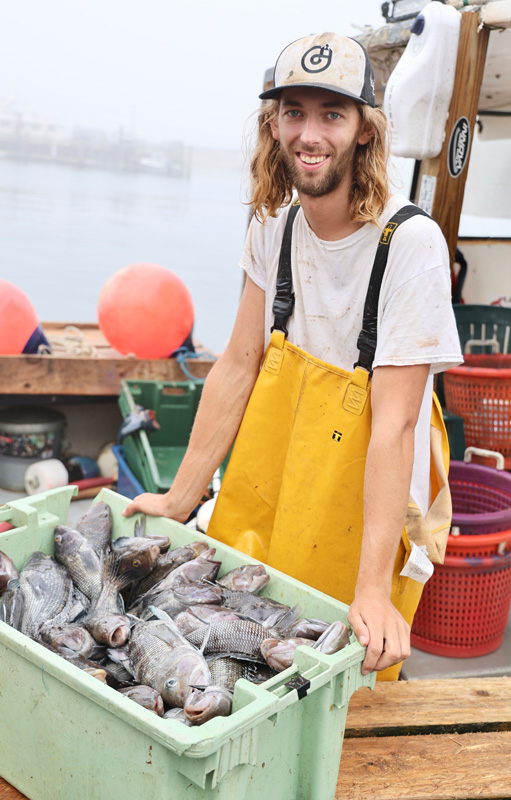
Otto Osmers
Otto is a 23-year-old commercial fisherman, fishing for black bass, conch, and scalloping out of Menemsha. The morning I met up with Otto, it was pea-soup thick fog, and he was just coming in with some black sea bass, as the season quota is nearly met. Otto’s uncle, Tom Osmers, a legend in the fishing community for his environmentalist advocacy for sustainable oyster farming and fishing, was a generous spirit and a great influence on Otto. He spent his high school years working in Menemsha on fishing boats and at the Fish House, a seafood wholesaler that closed in 2020 and is now the Martha’s Vineyard Seafood Collaborative. Otto owned his first boat at 15 or 16 he says, and has owned five boats already — sold two, has two for sale. His main boat now is the Right Stuff, which he bought as a “good deal” from a retiring fisherman.
When did you figure out fishing was what you wanted to do?
I did a year at college and came back when my grades were really bad. I was always talking to my buddies back home who were fishing or scalloping. I just think I kind of knew pretty quick school wasn’t for me. I started scalloping that summer with a friend and I never went back to school.
What do you love about your life here and your work?
It’s a lot of fun. I mean, it’s hard but it can be really rewarding and really tough. Rewarding economically and mentally — when you have a good day it’s always great. Everyone’s catching. It’s like there’s no better feeling when the pots are full. That’s definitely the best feeling ever. Or when you’re scalloping offshore and coming in after like a week or two-week trip — that’s always rewarding, that’s always great.
What challenges do you see for the Island?
Definitely living costs. I’m lucky. On my family property, I’m building a house right now, a detached bedroom. So I’m really lucky to have that, to be able to do that. But I mean, that’s not cheap either. But definitely, housing is really hard here, and the cost of living too. So it’s definitely hard, getting gear or getting bait can be challenging. You’re isolated here, and there’s only a fixed number of houses here and they’re all getting bought up. So I mean, housing is obviously what is really hard. So I don’t know what’s going to happen, because there is a huge wealth divide, everything’s getting bought up.
Where do you see yourself in 10 years, your industry?
You know, doing the same thing. Every year is different, there is a lot of bouncing around. Last winter, I did some carpentry and scalloping. I like to stay busy, whatever it takes.
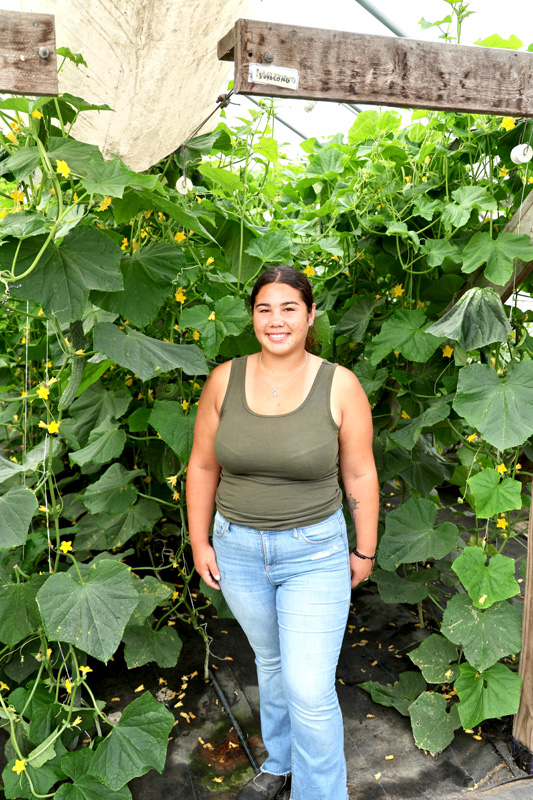
Julia Felix
Julia is 23 years old and the greenhouse manager at Morning Glory Farm. Julia graduated from the University of Maine with a degree in sustainable agriculture and a minor in resource agribusiness economics/leadership. A stroke of luck and an online help-wanted ad brought her home and to a career in farming she loves.
When did you know you wanted to stay here?
Honestly, throughout most of college, I would have said I wanted to be anywhere but the Vineyard. As graduation got closer, I was more and more unsure of where I wanted to be and how I wanted to start my career. About a month before graduation I was sitting in my 8 am propagation class and thought about how I grew up in a place with such a strong agricultural community. I googled “agricultural jobs Martha’s Vineyard” and Morning Glory Farm popped up, and I applied. I told myself if I got a job at the farm, I would return home, and that’s what happened. I’m so grateful for the opportunity Simon Athern and Ryan Hassel gave me, and now I couldn’t be happier that I decided to come back to the Island.
When did you figure out farming was what you wanted to do?
Well, I grew up going to my grandparents’ dairy/livestock farm in Brazil, and my dad has owned a landscaping company basically my entire life. I was around agriculture and was taught about plant care and propagation from a young age. I was always drawn to plants and farming, which could have been a product of my environment, but I think I did always have an innate interest in the industry. However, I took a gap year before I went to college, and spent time working on an aquaponics farm in Hawaii. I loved the work and fulfillment that came with feeding people. I guess that experience is what gave me the definitive idea that I wanted to pursue a degree in plant or agricultural sciences.
What do you love about your life here and your work?
I guess I enjoy being home because of my job and being able to see my family. Over the past few years I scarcely saw my parents and sister, because I was always busy with work and school. As for my job, I love getting my hands dirty, working with plants, and learning new things all the time. Also, MoGlo has a phenomenal workplace environment and I genuinely like being there.
What challenges do you see for the Island?
I think the challenges I see for the Island are the ones we are facing now — housing and the cost of living. In my opinion, the housing issue is going to continue to worsen and the cost of living will just keep increasing. I think the community is taking strides to improve these issues, but they are difficult issues, and I think the Island will always face them. I’m noticing less and less kids who leave and get degrees return home. I think these individuals could be really beneficial to the community, so providing them opportunities and incentives to come home is important.
Where do you see yourself in 10 years, your industry?
Ten years is far away, and I don’t really have a concrete path I want to follow. Although, I do see myself pursuing a career in horticulture and going back to school. I really enjoy learning and continuously expanding my knowledge; I do want to reach for a higher-level degree eventually. As of right now, I’m happy where I am, and plan to stay for a while.
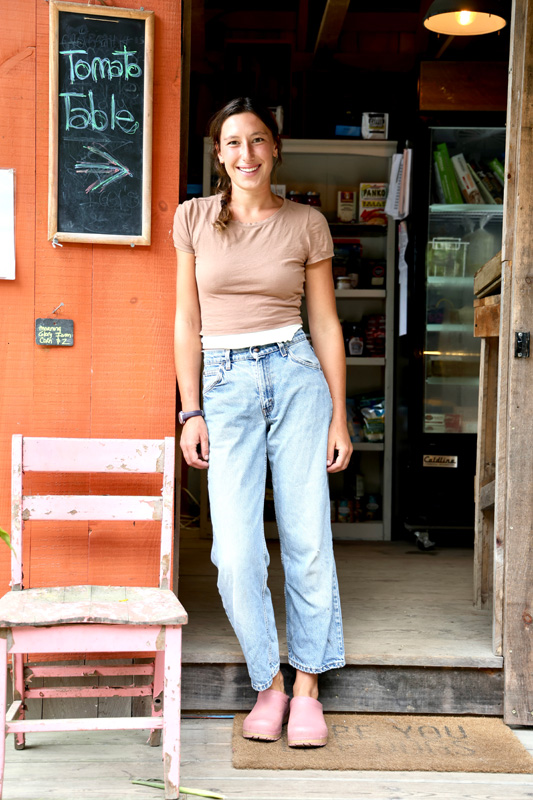
Ruby Dix
Ruby is 25 years old and earned a degree in food studies at Bennington College in Vermont. Ruby grew up farming on her family farm, North Tabor Farm in Chilmark. Her parents, Rebecca Miller and Matthew Dix, started the farm back in the mid-1990s, growing everything —beautiful salad greens, tomatoes, arugula, melons, potatoes, you name it! Luckily for the farm, Ruby has stepped into a natural progression, the next generation at North Tabor Farm.
When did you know you wanted to stay here?
My junior year of college. Whenever COVID kind of started, I went online and then I had the option of going back to school in person. My major was food studies and it just didn’t make sense; I’m doing my major, food studies, on the Vineyard by working here. So I was just like, I’m just going stay here and see what happens.
When did you figure out farming was what you wanted to do?
I think I’ve been managing the farm since I was 18, but it was very seasonal. I’d come in when I got out of school and I’d manage for a season, and then I’d have to go back to school, so probably my first full season that I got to be here. The whole time with a crew was when I was like, oh, I want to do this because I got to have the full experience and I still enjoyed it. I wasn’t bored or worn out by the end of it. And so I was like, I think this is what I want to do.
What do you love about your life here and your work?
I just like to be able to do a lot of different things in a day. I don’t think a lot of jobs that are outside allow you to do 10 different things from seeding to harvesting, to planting to doing the Farmers Market. It’s just nice to keep moving and doing all different things. My farm is small enough that I never spend one day doing one thing. There’s at least five things on our list every day.
What challenges do you see for the Island?
I think the obvious one is housing. I live on the farm in the summer and then I have a winter rental down the road in Chilmark. I’m just ready to have my own space and accumulate stuff. I’ve never owned furniture or decorated a space. My parents are building a year-round, two-bedroom apartment. It’s lovely and it’s going to be farmer housing and I’m sure I’ll be staying in it in some capacity, but I ultimately don’t want to live with my parents my whole life, and especially not where I work. My partner works here as well. So it’s just like, everything is here.
Where do you see yourself in 10 years?
I don’t really think too far ahead. I would love to be farming. I definitely want to have gone to a bunch of different places in the winter and traveled. Probably have my own spot. Love to see just some projects finished and cleaning up some stuff.
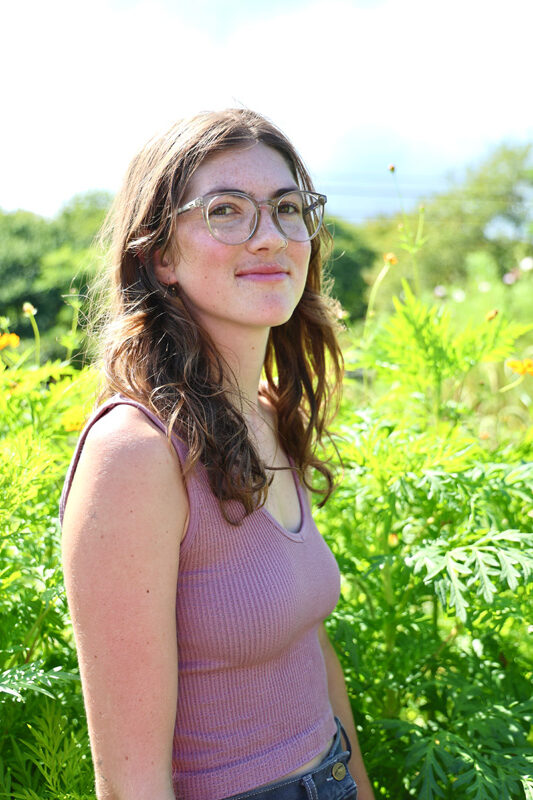
Grace Kenney
Grace is about to turn 24 and graduated from Bennington College. Grace spends her spring and summers at Tea Lane Farm in Chilmark where she co-manages the farm, growing flowers and working floral design for weddings with Krishana Collins, the farm’s owner. Starting in November, and through the winter, Grace will scallop with her partner Matteus Scheffer in Edgartown.
When did you know you wanted to stay here?
I certainly already knew it. I really love the community here. And that was one thing that I struggled with when I went away to school was sort of being plopped somewhere else. Like you’re not really part of a community but you are. It just wasn’t what I was looking for. I don’t even know the word but it just wasn’t what I wanted. I really wanted to dig my roots in and be somewhere and start building on that community and being a part of that community. So I sort of knew that I wanted to come back here.
What do you love about your life here and your work?
I really enjoy being part of a community, and like being part of such a rich community where there’s such a heavy agricultural and farming community. I love having my foot in both doorways [farming and fishing]. It is really interesting. And I wouldn’t want to do it any other way, because I couldn’t choose which one I liked more. It’s nice. And I just think that they’re both so important to feed and fuel the Island itself. I think without the farming and agriculture and the fishing industry, Martha’s Vineyard wouldn’t really be Martha’s Vineyard.
What Challenges do you see for the Island?
It’s really hard when this community is so special and so inviting, but at the same time is just closing doors on young people because there’s just so many things that this Island is struggling with. It’s not easy for a young person to struggle with because there’s not a lot of doors that are open for a 20-something-year-old to find a house. You’re struggling with housing and it’s just ridiculous at this age, and then you hear all these stories of people being like, ‘well, I did it so you can do it.’ But now it’s changed completely.
Where do you see yourself in 10 years, your industry? Your hopes.
I wish I knew the answer to it. But I do hope that I’m here and I hope that I have the ability to either buy land or find land or have a little bit more stable option in those 10 years with housing. I hope to still be farming or fishing or doing something in that because I really do love it and it’s important for my soul on this Island.
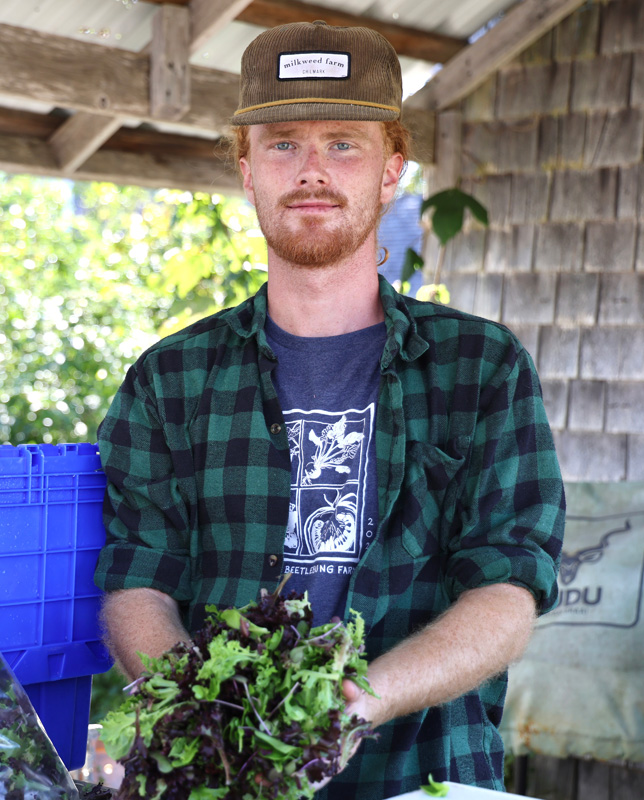
Theo Gallagher
Theo is 23 years old and is in his fifth year farming at Beetlebung Farm in Chilmark, where he is the soil fertility and integrated pest management lead. After studying sustainable agriculture at University of Maine for a year, Theo decided he was ready to get to work focusing on soil science and soil heath. Beetlebung Farm was the perfect fit because the farm’s mission is to restore the soil using regenerative practices while growing a thriving market farm.
When did you know you wanted to stay here?
I have thought about Maine, but I feel like this Island has so many well-resourced, cool farming opportunities. During high school, I worked as a landscaper and then for Grey Barn. Then, in 2019, when Beetlebung changed hands, I was their first hire. I have been here ever since.
When did you figure out regenerative farming was what you wanted to do?
It wasn’t a decision. When you are farming, things slowly come together. With regenerative farming, you first learn that there is more nutrient density. Then you see how it restores the land. And then you taste the food and it just tastes better.
What do you love about your life here on MV and your work?
Everyone is trying something, working on ideas. And it is not competitive. There’s a great sense of community. We all get along. I ran into Whippoorwill’s Andrew Woodruff at the gas station the other day and we spent about 20 minutes talking about soil. I love that. I have a lot of gratitude for this place. We can all get caught up in how things should be, but it is really beautiful here. I can be anywhere — the beach, the woods, in a field or even eating the food — and I feel the beauty.
What challenges do you see for the Island?
Housing. If we don’t solve this, we won’t have a community. I live with my family. If I didn’t, I might be able to stay, but it would be tough.
Where do you see yourself in 10 years, your industry? Your hopes.
I’d be running my own farm here. Growing a combination of veggies, flowers.

